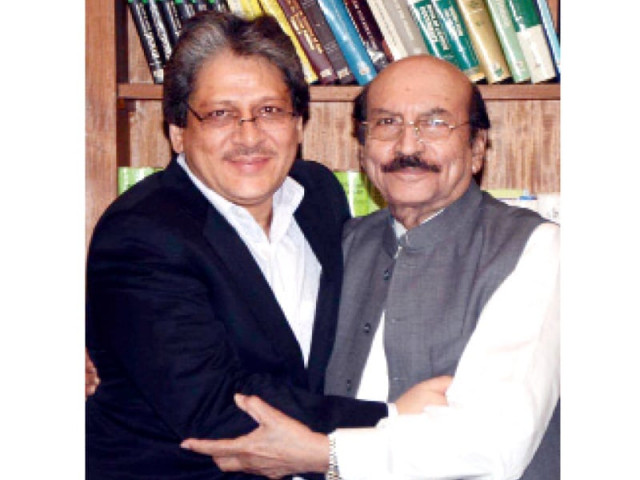City management: Sindh’s coalition govt dies, as new LG system is born
In a mix of the 1979 and 2001 set-ups, five metropolitan corporations created.

City management: Sindh’s coalition govt dies, as new LG system is born
No one has actually seen it in the flesh, but the new local government ordinance, delivered by C-section, has already unleashed a political storm in Sindh. Five ministers have resigned, the coalition has kicked the bucket and the nationalists are going on strike next week.
The system that runs Sindh’s cities expired legally in 2009 with Mustafa Kamal as the last Karachi city nazim. But for three years, Sindh’s two key parties have been wrangling over a new system. It was finally birthed on Friday and named the Sindh Peoples Government Ordinance 2012. Governor Ishrat-ul Ebad signed it as Chief Minister Qaim Ali Shah looked on. As the Sindh Assembly is not in session, the new law was passed as an ordinance, which means that elected representatives or MPAs have not been able to debate and vote on it.
The alliance between the ruling Pakistan Peoples Party and the Muttahida Qaumi Movement is intact but all other coalition partners - the ANP, PML-F, NPP and PML-Q - have parted ways.
ANP resignations
Soon after the papers were signed early Friday morning, the ANP’s Labour minister Ameer Nawab marched to Chief Minister House and resigned. “PPP ministers have betrayed and bypassed our suggestions,” he said. “They had to show the final copy of the ordinance before it was passed.” He said the CM had refused to accept his resignation but he was giving it up as his party’s stand was more important to him.
The ANP is one of the smaller coalition partners. It won two seats out of the 168 in the Sindh Assembly. They have been watching from the sidelines as the PPP and MQM have ruled Sindh in the name of the ‘policy of reconciliation’. “In the name of decentralization they divided Hyderabad into three districts, but centralized Karachi from five to one,” Nawab said. “We had already communicated to the PPP negotiating team that the ANP will not accept Musharraf’s town system in Karachi. But they did not heed it.” CM Qaim Ali Shah telephoned the ANP’s Shahi Syed to try and assure him that they would take all coalition partners along, but it appears that the ANP has heard that hollow promise before.
PML-F resignations
The next ministers to resign came from the PML-F: Jam Madad, the minister for science and technology, Rafique Banbhan, auqaf minister, special education adviser Imtiaz Shaikh (status of minister), adviser on mines Abdul Razzaque Nasir Nizamani, special assistant Noor Hassan Khaskheli, and special assistant Khadim Hussain Arain.
At a meeting and press conference at Raja House, the party said the resignations were tendered to party leader Pir Pagara. He refused to take a phone call from the CM.
NPP resignations
Next was the National Peoples Party (NPP). It has three seats in Sindh and two in the National Assembly. Its minister, Abid Jatoi for livestock, resigned.
By the end of the day five ministers, two advisers and a special assistant had resigned.
The PML-Q leaders were divided. PML-Q’s Shaharyar Mahar announced he was resigning from the ministry of alternative energy.
But Adviser Haleem Adil Shaikh said that this was his personal decision and as a party they have not yet decided leave the governmentof. “We had told the PPP that the PML-Q is in favour of five districts rather than the town system, but the party’s leaders ignored our proposal,” Shaikh said.
No notification yet
Till late Friday night, the government had yet to issue an official notification on implementing the new law. The new ordinance is a public document but has yet to be made public. Officials at Governor and CM House and even the law department were not willing to share a copy.
Information Minister Sharjeel Inam Memon said that they would make Sindh Peoples Government Ordinance 2012 public on Friday. Law Secretary Ghulam Nabi Shah and the Governor House spokesperson said it was being printed.
The new system
According to the ordinance, five metropolitan corporations would be set up in Karachi, Hyderabad, Sukkur, Mirpurkhas and Larkana where mayors and deputy mayor would be appointed. There will be district councils in the rest of the provinces, which will be managed by chairmen and deputy chairmen. Karachi’s eighteen towns would be revived, but commissioners would continue to work in the five districts to manage revenue and law and order.
The Karachi Water and Sewerage Board, whose MD just resigned a day ago, would be under the mayor. The Malir and Lyari development authorities would be given to the local government minister who would consult the mayor on development schemes. The Sindh government will deal with the Sindh Building Control Authority.
The ordinance says that the election of the mayor and deputy mayor will be held under the pattern of the 2001 system and they will have all the financial powers and will be accountable to the provincial government.
Talking to The Express Tribune, the MQM’s Syed Sardar Ahmed said that a chief metropolitan officer would also be appointed under the mayor to manage the administrative affairs of the metropolitan corporations as well as property and local taxes.
The government of Karachi controls:
Social welfare
Cooperatives/cooperation
Primary education
Technical education
Civil defence
KMC and KDA land
Property taxes
Transport
KWSB
Community development
Primary health
Environmental control
Published in The Express Tribune, September 8th, 2012.



















COMMENTS
Comments are moderated and generally will be posted if they are on-topic and not abusive.
For more information, please see our Comments FAQ